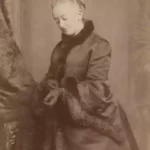 | |
The Four-Fifteen Express | |
| Author | Amelia B. Edwards |
|---|---|
| Published |
1857
|
| Language | English |
| Nationality | British |
| Genre | Adventure, Supernatural Fiction |
1857 Short Story
The Four-Fifteen Express
The Four-Fifteen Express is an English Adventure, Supernatural Fiction short story by British writer Amelia B. Edwards. It was first published in 1857.
The Four-Fifteen Express
by Amelia B. Edwards
The events which I am about to relate took place between nine and ten years ago. Sebastopol had fallen in the early spring, the peace of Paris had been concluded since March, our commercial relations with the Russian empire were but recently renewed; and I, returning home after my first northward journey since the war, was well pleased with the prospect of spending the month of December under the hospitable and thoroughly English roof of my excellent friend, Jonathan Jelf, Esq., of Dumbleton Manor, Clayborough, East Anglia. Travelling in the interests of the wellknown firm in which it is my lot to be a junior partner, I had been called upon to visit not only the capitals of Russia and Poland, but had found it also necessary to pass some weeks among the trading ports of the Baltic; whence it came that the year was already far spent before I again set foot on English soil, and that, instead of shooting pheasants with him, as I had hoped, in October, I came to be my friend’s guest during the more genial Christmas-tide.
My voyage over, and a few days given up to business in Liverpool and London, I hastened down to Clayborough with all the delight of a school-boy whose holidays are at hand. My way lay by the Great East Anglian line as far as Clayborough station, where I was to be met by one of the Dumbleton carriages and conveyed across the remaining nine miles of country. It was a foggy afternoon, singularly warm for the 4th of December, and I had arranged to leave London by the 4:15 express. The early darkness of winter had already closed in; the lamps were lighted in the carriages; a clinging damp dimmed the windows, adhered to the door-handles, and pervaded all the atmosphere; while the gas-jets at the neighbouring book-stand diffused a luminous haze that only served to make the gloom of the terminus more visible. Having arrived some seven minutes before the starting of the train, and, by the connivance of the guard, taken sole possession of empty compartment, I lighted my travelling-lamp, made myself particularly snug, and settled down to the undisturbed enjoyment of a book and a cigar. Great, therefore, was my disappointment when, at the last moment, a gentleman came hurrying along the platform, glanced into my carriage, opened the locked door with a private key, a stepped in.
It struck me at the first glance that I had seen him beforea tall, spare man, thin-lipped, light-eyed, with an ungraceful stoop in the shoulders and scant gray hair worn somewhat long upon collar. He carried a light waterproof coat, an umbrella, and a large brown japanned deed-box, which last he placed under the seat. This done, he felt carefully in his breast-pocket, as if to make certain of the safety of his purse or pocket-book, laid his umbrella in the netting overhead, spread the waterproof across his knees, and exchanged his hat for a travelling-cap of some Scotch material. By this time the train was moving out of the station and into the faint gray of the wintry twilight beyond.
I now recognised my companion. I recognised him from the moment when he removed his hat and uncovered the lofty, furrowed, and somewhat narrow brow beneath. I had met him, as I distinctly remembered, some three years before, at the very house for which, in all probability, he was now bound, like myself. His name was Dwerrihouse, he was a lawyer by profession, and, if I was not greatly mistaken, was first cousin to the wife of my host. I knew also that he was a man eminently “well-to-do,” both as regarded his professional and private means. The Jelfs entertained him with that sort of observant courtesy which falls to the lot of the rich relation, the children made much of him, and the old butler, albeit somewhat surly “to the general,” treated him with deference. I thought, observing him by the vague mixture of lamplight and twilight, that Mrs. Jelf’s cousin looked all the worse for the three years’ wear and tear which had gone over his head since our last meeting. He was very pale, and had a restless light in his eye that I did not remember to have observed before. The anxious lines, too, about his mouth were deepened, and there was a cavernous, hollow look about his cheeks and temples which seemed to speak of sickness or sorrow. He had glanced at me as he came in, but without any gleam of recognition in his face. Now he glanced again, as I fancied, somewhat doubtfully. When he did so for the third or fourth time I ventured to address him.
“Mr. John Dwerrihouse, I think?”
“That is my name,” he replied.
“I had the pleasure of meeting you at Dumbleton about three years ago.”
Mr. Dwerrihouse bowed.
“I thought I knew your face,” he said; “but your name, I regret to say”
“LangfordWilliam Langford. I have known Jonathan Jelf since we were boys together at Merchant Taylor’s, and I generally spend a few weeks at Dumbleton in the shooting season. I suppose we are bound for the same destination?”
“Not if you are on your way to the manor,” he replied. “I am travelling upon business,rather troublesome business too,while you, doubtless, have only pleasure in view.”
“Just so. I am in the habit of looking forward to this visit as to the brightest three weeks in all the year.”
“It is a pleasant house,” said Mr. Dwerrihouse.
“The pleasantest I know.”
“And Jelf is thoroughly hospitable.”
“The best and kindest fellow in the world!”
“They have invited me to spend Christmas week with them,” pursued Mr. Dwerrihouse, after a moment’s pause. “And you are coming?”
“I cannot tell. It must depend on the issue of this business which I have in hand. You have heard perhaps that we are about to construct a branch line from Blackwater to Stockbridge.”
I explained that I had been for some months away from England, and had therefore heard nothing of the contemplated improvement. Mr. Dwerrihouse smiled complacently.
“It will be an improvement,” he said, “a great improvement. Stockbridge is a flourishing town, and needs but a more direct railway communication with the metropolis to become an important centre of commerce. This branch was my own idea. I brought the project before the board, and have myself superintended the execution of it up to the present time.”
“You are an East Anglian director, I presume?”
“My interest in the company,” replied Mr. Dwerringhouse, “is threefold. I am a director, I am a considerable shareholder, and, as head of the firm of Dwerrihouse, Dwerrihouse & Craik, I am the company’s principal solicitor.”
Loquacious, self-important, full of his pet project, and apparently unable to talk on any other subject, Mr. Dwerrihouse then went on to tell of the opposition he had encountered and the obstacles he had overcome in the cause of the Stockbridge branch. I was entertained with a multitude of local details and local grievances. The rapacity of one squire, the impracticability of another, the indignation of the rector whose glebe was threatened, the culpable indifference of the Stockbridge townspeople, who could not be brought to see that their most vital interests hinged upon a junction with the Great East Anglian line; the spite of the local newspaper, and the unheard-of difficulties attending the Common question, were each and all laid before me with a circumstantiality that possessed the deepest interest for my excellent fellow-traveller, but none whatever for myself. From these, to my despair, he went on to more intricate matters: to the approximate expenses of construction per mile; to the estimates sent in by different contractors; to the probable traffic returns of the new line; to the provisional clauses of the new act as enumerated in Schedule D of the company’s last half-yearly report; and so on and on and on, till my head ached and my attention flagged and my eyes kept closing in spite of every effort that I made to keep them open. At length I was roused by these words:
“Seventy-five thousand pounds, cash down.”
“Seventy-five thousand pounds, cash down,” I repeated, in the liveliest tone I could assume. “That is a heavy sum.”
“A heavy sum to carry here,” replied Mr. Dwerrihouse, pointing significantly to his breastpocket, “but a mere fraction of what we shall ultimately have to pay.”
“You do not mean to say that you have seventy-five thousand pounds at this moment upon your person?” I exclaimed.
“My good sir, have I not been telling you so for the last half-hour?” said Mr. Dwerrihouse, testily. “That money has to be paid over at half-past eight o’clock this evening, at the office of Sir Thomas’s solicitors, on completion of the deed of sale.”
“But how will you get across by night from Blackwater to Stockbridge with seventy-five thousand pounds in your pocket?”
“To Stockbridge!” echoed the lawyer. “I find I have made myself very imperfectly understood. I thought I had explained how this sum only carries us as far as Mallingford,the first stage, as it were, of our journey,and how our route from Blackwater to Mallingford lies entirely through Sir Thomas Liddell’s property.”
“I beg your pardon,” I stammered. “I fear my thoughts were wandering. So you only go as far as Mallingford to-night?” “Precisely. I shall get a conveyance from the ‘Blackwater Arms.’ And you?” ‘Oh, Jelf sends a trap to meet me at Clayborbough! Can I be the bearer of any message from you?”
“You may say, if you please, Mr. Langford, that I wished I could have been your companion all the way, and that I will come over, if possible, before Christmas.”
“Nothing more?”
Mr. Dwerrihouse smiled grimly. “Well,” he said, “you may tell my cousin that she need not burn the hall down in my honour time, and that I shall be obliged if she will order the blue-room chimney to be swept before I arrive.”
“That sounds tragic. Had you a conflagration on the occasion of your last visit to Dumbleton?”
“Something like it. There had been no fire lighted in my bedroom since the spring, the flue was foul, and the rooks had built in it; so when I went up to dress for dinner I found the room full of smoke and the chimney on fire. Are we already at Blackwater?”
The train had gradually come to a pause while Mr. Dwerrihouse was speaking, and, on putting my head out of the window, I could see the station some few hundred yards ahead. There was another train before us blocking the way, and the guard was making use of the delay to collect the Blackwater tickets. I had scarcely ascertained our position when the ruddy-faced official appeared at our carriage door.
“Tickets, sir!” said he.
“I am for Clayborough,” I replied, holding out the tiny pink card.
He took it, glanced at it by the light of his little lantern, gave it back, looked, as I fancied, somewhat sharply at my fellow-traveller, and disappeared.
“He did not ask for yours,” I said, with some surprise.
“They never do,” replied Mr. Dwerrihouse; “they all know me, and of course I travel free.”
“Blackwater! Blackwater!” cried the porter, running along the platform beside us as we glided into the station.
Mr. Dwerrihouse pulled out his deed-box, put his travelling-cap in his pocket, resumed his hat, took down his umbrella, and prepared to be gone.
“Many thanks, Mr. Langford, for your society,” he said, with old-fashioned courtesy. “I wish you a good-evening.”
“Good-evening,” I replied, putting out my hand.
But he either did not see it or did not choose to see it, and, slightly lifting his hat, stepped out upon the platform. Having done this, he moved slowly away and mingled with the departing crowd.
Leaning forward to watch him out of sight, I trod upon something which proved to be a cigar-case. It had fallen, no doubt, from the pocket of his waterproof coat, and was made of dark morocco leather, with a silver monogram upon the side. I sprang out of the carriage just as the guard came up to lock me in.
“Is there one minute to spare?” I asked, eagerly. “The gentleman who travelled down with me from town has dropped his cigar-case; he is not yet out of the station.”
“Just a minute and a half, sir,” replied the guard. “You must be quick.”
I dashed along the platform as fast as my feet could carry me. It was a large station, and Mr. Dwerrihouse had by this time got more than half-way to the farther end.
I, however, saw him distinctly, moving slowly with the stream. Then, as I drew nearer, I saw that he had met some friend, that they were talking as they walked, that they presently fell back somewhat from the crowd and stood aside in earnest conversation. I made straight for the spot where they were waiting. There was a vivid gas-jet just above their heads, and the light fell full upon their faces. I saw both distinctlythe face of Mr. Dwerrihouse and the face of his companion. Running, breathless, eager as I was, getting in the way of porters and passengers, and fearful every instant lest I should see the train going on without me, I yet observed that the new-comer was considerably younger and shorter than the director, that he was sandy-haired, mustachioed, small-featured, and dressed in a close-cut suit of Scotch tweed. I was now within a few yards of them. I ran against a stout gentleman, I was nearly knocked down by a luggage-truck, I stumbled over a carpet-bag; I gained the spot just as the driver’s whistle warned me to return.
To my utter stupefaction, they were no longer there. I had seen them but two seconds beforeand they were gone! I stood still; I looked to right and left; I saw no sign of them in any direction. It was as if the platform had gaped and swallowed them.
“There were two gentlemen standing here a moment ago,” I said to a porter at my elbow; “which way can they have gone?”
“I saw no gentlemen, sir,” replied the man. The whistle shrilled out again. The guard, far up the platform, held up his arm, and shouted to me to “come on!”
“If you’re going on by this train, sir,” said the porter, “you must run for it.”
I did run for it, just gained the carriage as the train began to move, was shoved in by the guard, and left, breathless and bewildered, with Mr. Dwerrihouse’s cigar-case still in my hand.
It was the strangest disappearance in the world; It was like a transformation trick in a pantomime. They were there one moment,palpably there, walking, with the gaslight full upon their faces,and the next moment they were gone. There was no door near, no window, no staircase; it was a mere slip of barren platform, tapestried with big advertisements. Could anything be more mysterious?
It was not worth thinking about, and yet, for my life, I could not help pondering upon itpondering, wondering, conjecturing, turning it over and over in my mind, and beating my brains for a solution of the enigma. I thought of it all the way from Blackwater to Clayborough. I thought of it all the way from Clayborough to Dumbleton, as I rattled along the smooth highway in a trim dog-cart, drawn by a splendid black mare and driven by the silentest and dapperest of East Anglian grooms.
We did the nine miles in something less than an hour, and pulled up before the lodge-gates just as the church clock was striking half-past seven. A couple of minutes more, and the warm glow of the lighted hall was flooding out upon the gravel, a hearty grasp was on my hand, and a clear jovial voice was bidding me “welcome to Dumbleton.”
“And now, my dear fellow,” said my host, when the first greeting was over, “you have no time to spare. We dine at eight, and there are people coming to meet you, so you must just get the dressing business over as quickly as may be. By the way, you will meet some acquaintances; the Biddulphs are coming, and Prendergast (Prendergast of the Skirmishers) is staying in the house. Adieu! Mrs. Jelf will be expecting you in the drawing-room.”
I was ushered to my roomnot the blue room, of which Mr. Dwerrihouse had made disagreeable experience, but a pretty little bachelor’s chamber, hung with a delicate chintz and made cheerful by a blazing fire. I unlocked my portmanteau. I tried to be expeditious, but the memory of my railway adventure haunted me. I could not get free of it; I could not shake it off. It impeded me, worried me, it tripped me up, it caused me to mislay my studs, to mistie my cravat, to wrench the buttons off my gloves. Worst of all, it made me so late that the party had all assembled before I reached the drawing-room. I had scarcely paid my respects to Mrs. Jelf when dinner was announced, and we paired off, some eight or ten couples strong, into the dining-room.
I am not going to describe either the guests or the dinner. All provincial parties bear the strictest family resemblance, and I am not aware that an East Anglian banquet offers any exception to the rule. There was the usual country baronet and his wife; there were the usual country parsons and their wives; there was the sempiternal turkey and haunch of venison. Vanitas vanitatum. There is nothing new under the sun.
I was placed about midway down the table. I had taken one rector’s wife down to dinner, and I had another at my left hand. They talked across me, and their talk was about babies; it was dreadfully dull. At length there came a pause. The entrees had just been removed, and the turkey had come upon the scene. The conversation had all along been of the languidest, but at this moment it happened to have stagnated altogether. Jelf was carving the turkey; Mrs. Jelf looked as if she was trying to think of something to say; everybody else was silent. Moved by an unlucky impulse, I thought I would relate my adventure.
“By the way, Jelf,” I began, “I came down part of the way to-day with a friend of yours.”
“Indeed!” said the master of the feast, slicing scientifically into the breast of the turkey. “With whom, pray?”
“With one who bade me tell you that he should, if possible, pay you a visit before Christmas.”
“I cannot think who that could be,” said my friend, smiling.
“It must be Major Thorp,” suggested Mrs. Jelf.
I shook my head.
“It was not Major Thorp,” I replied; “it was a near relation of your own, Mrs. Jelf.”
“Then I am more puzzled than ever,” rep! my hostess. “Pray tell me who it was.”
“It was no less a person than your cousin, Mr. John Dwerrihouse.”
Jonathan Jelf laid down his knife and fork. Mrs. Jelf looked at me in a strange, startled way, and said never a word.
“And he desired me to tell you, my dear madam, that you need not take the trouble to burn the hall down in his honour this time, but only to have the chimney of the blue room swept before his arrival.”
Before I had reached the end of my sentence I became aware of something ominous in the faces of the guests. I felt I had said something which I had better have left unsaid, and that for some unexplained reason my words had evoked a general consternation. I sat confounded, not daring to utter another syllable, and for at least two whole minutes there was dead silence round the table. Then Captain Prendergast came to the rescue.
“You have been abroad for some months, have you not, Mr. Langford?” he said, with the desperation of one who flings himself into the breach.
“I heard you had been to Russia. Surely you have something to tell us of the state and temper of the country after the war?”
I was heartily grateful to the gallant Skirmisher for this diversion in my favour. I answered him, I fear, somewhat lamely; but he kept the conversation up, and presently one or two others joined in and so the difficulty, whatever it might have been, was bridged overbridged over, but not repaired. A something, an awkwardness, a visible constraint remained. The guests hitherto had been simply dull, but now they were evidently uncomfortable and embarrassed.
The dessert had scarcely been placed upon the table when the ladies left the room. I seized the opportunity to select a vacant chair next Captain Prendergast.
“In heaven’s name,” I whispered, “what was the matter just now? What had I said?” “You mentioned the name of John Dwerrihouse.”
“What of that? I had seen him not two hours before.”
“It is a most astounding circumstance that you should have seen him,” said Captain Prendergast. “Are you sure it was he?”
“As sure as of my own identity. We were talking all the way between London and Blackwater. But why does that surprise you?” “Because” replied Captain Prendergast, dropping his voice to the lowest whisper”because John Dwerrihouse absconded three months ago with seventy-five thousand pounds of the company’s money, and has never been heard of since.”
John Dwerrihouse had absconded three months agoand I had seen him only a few hours back! John Dwerrihouse had embezzled seventy-five thousand pounds of the company’s money, yet told me that he carried that sum upon his person! Were ever facts so strangely incongruous, so difficult to reconcile? How should he have ventured again into the light of day? How dared he show himself along the line? Above all, what had he been doing throughout those mysterious three months of disappearance?
Perplexing questions thesequestions which at once suggested themselves to the minds of all concerned, but which admitted of no easy solution. I could find no reply to them. Captain Prendergast had not even a suggestion to offer. Jonathan Jelf, who seized the first opportunity of drawing me aside and learning all that I had to tell, was more amazed and bewildered than either of us. He came to my room that night, when all the guests were gone, and we talked the thing over from every point of view; without, it must be confessed, arriving at any kind of conclusion.
“I do not ask you,” he said,” whether you can have mistaken your man. That is impossible.”
“As impossible as that I should mistake some stranger for yourself.”
“It is not a question of looks or voice, but of facts. That he should have alluded to the fire in the blue room is proof enough of John Dwerrihouse’s identity. How did he look?”
“Older, I thought; considerably older, paler, and more anxious.”
He has had enough to make him look anxious, anyhow, “said my friend, gloomily, “be he innocent or guilty.”
“I am inclined to believe that he is innocent,” I replied. “He showed no embarrassment when I addressed him, and no uneasiness when the guard came round. His conversation was open to a fault. I might almost say that he talked too freely of the business which he had in hand.”
“That again is strange, for I know no one more reticent on such subjects. He actually told you that he had the seventy-five thousand pounds in his pocket?”
“He did.”
“Humph! My wife has an idea about it, and she may be right”
“What idea?”
“Well, she fancieswomen are so clever, you know, at putting themselves inside people’s motives she fancies that he was tempted, that he did actually take the money, and that he has been concealing himself these three months in some wild part of the country, struggling possibly with his conscience all the time, and daring neither to abscond with his booty nor to come back and restore it.”
“But now that he has come back?”
“That is the point. She conceives that he has probably thrown himself upon the company’s mercy, made restitution of the money, and, being forgiven, is permitted to carry the business through as if nothing whatever had happened.”
“The last,” I replied, “is an impossible case. Mrs. Jelf thinks like a generous and delicate minded woman, but not in the least like a board of railway directors. They would never carry forgiveness so far.”
“I fear not; and yet it is the only conjecture that bears a semblance of likelihood. However we can run over to Clayborough to-morrow and see if anything is to be learned. By the way Prendergast tells me you picked up his cigar-case.”
“I did so, and here it is.”
Jelf took the cigar-case, examined it by the light of the lamp, and said at once that it was beyond doubt Mr. Dwerrihouse’s property, and that he remembered to have seen him use it.
“Here, too, is his monogram on the side,” he added” a big J transfixing a capital D. He used to carry the same on his note-paper.”
“It offers, at all events, a proof that I was not dreaming.”
“Ay, but it is time you were asleep and dreaming now. I am ashamed to have kept you up so long. Good-night.”
“Good-night, and remember that I am more than ready to go with you to Clayborough or Blackwater or London or anywhere, if I can be of the least service.”
“Thanks! I know you mean it, old friend, and it may be that I shall put you to the test. Once more, good-night.”
So we parted for that night, and met again in the breakfast-room at half-past eight next morning. It was a hurried, silent, uncomfortable meal; none of us had slept well, and all were thinking of the same subject. Mrs. Jelf had evidently been crying. Jelf was impatient to be off, and both Captain Prendergast and myself felt ourselves to be in the painful position of outsiders who are involuntarily brought into a domestic trouble. Within twenty minutes after we had left the breakfast-table the dog-cart was brought round, and my friend and I were on the road to Clayborough.
“Tell you what it is, Langford,” he said, as we sped along between the wintry hedges,” I do not much fancy to bring up Dwerrihouse’s name at Clayborough. All the officials know that he is my wife’s relation, and the subject just now is hardly a pleasant one. If you don’t much mind, we will make the 11:10 to Blackwater. It’s an important station, and we shall stand a far better chance of picking up information there than at Clayborough.”
So we took the 11:10, which happened to be an express, and, arriving at Blackwater about a quarter before twelve, proceeded at once to prosecute our inquiry.
We began by asking for the station-master, a big, blunt, businesslike person, who at once averred that he knew Mr. John Dwerrihouse perfectly well, and that there was no director on the line whom he had seen and spoken to so frequently.
“He used to be down here two or three times a week about three months ago,” said he, “when the new line was first set afoot; but since then, you know, gentlemen”
He paused significantly.
Jelf flushed scarlet.
“Yes, yes,” he said, hurriedly; “we know all about that. The point now to be ascertained is whether anything has been seen or heard of him lately.”
“Not to my knowledge,” replied the stationmaster.
“He is not known to have been down the line any time yesterday, for instance?”
The station-master shook his head.
“The East Anglian, sir,” said he, “is about the last place where he would dare to show himself. Why, there isn’t a station-master, there isn’t guard, there isn’t a porter, who doesn’t know Mr. Dwerrihouse by sight as well as he knows his own face in the looking-glass, or who wouldn’t telegraph for the police as soon as he had set eyes on him at any point along the line. Bless you, sir! there’s been a standing order out against him ever since the 25th of September last.”
“And yet,” pursued my friend, “a gentleman who travelled down yesterday from London to Clayborough by the afternoon express testifies that he saw Mr. Dwerrihouse in the train, and that Mr. Dwerrihouse alighted at Blackwater station.”
“Quite impossible, sir,” replied the station-master promptly.
“Why impossible?”
“Because there is no station along the line where he is so well known or where he would run so great a risk. It would be just running his head into the lion’s mouth; he would have been mad to come nigh Blackwater station; and if he had come he would have been en arrested before he left the platform.”
“Can you tell me who took the Blackwater tickets of that train?”
“I can, sir. It was the guard, Benjamin Somers.”
“And where can I find him?”
“You can find him, sir, by staying here, if you please, till one o’clock. He will be coming through with the up express from Crampton, which stays in Blackwater for ten minutes.”
We waited for the up express, beguiling the time as best we could by strolling along the Blackwater road till we came almost to the outskirts of the town, from which the station was distant nearly a couple of miles. By one o’clock we were back again upon the platform and waiting for the train. It came punctually, and I at once recognised the ruddy-faced guard who had gone down with my train the evening before.
“The gentlemen want to ask you something about Mr. Dwerrihouse, Somers,” said the station-master, by way of introduction. The guard flashed a keen glance from my face to Jelf’s and back again to mine.
“Mr. John Dwerrihouse, the late director?” said he, interrogatively.
“The same,” replied my friend. “Should you know him if you saw him?”
“Anywhere, sir.”
“Do you know if he was in the 4:15 express yesterday afternoon?”
“He was not, sir.”
“How can you answer so positively?”
“Because I looked into every carriage and saw every face in that train, and I could take my oath that Mr. Dwerrihouse was not in it. This gentleman was,” he added, turning sharply upon me. “I don’t know that I ever saw him before in my life, but I remember his face perfectly. You nearly missed taking your seat in time at this station, sir, and you got out at Clayborough.”
“Quite true, guard,” I replied; “but do you not remember the face of the gentleman who travelled down in the same carriage with me as far as here?”
“It was my impression, sir, that you travelled down alone,” said Somers, with a look of some surprise. “By no means. I had a fellow-traveller as far as Blackwater, and it was in trying to restore him the cigar-case which he had dropped in the carriage that I so nearly let you go on without me.”
“I remember your saying something about a cigar-case, certainly,” replied the guard; “but”
“You asked for my ticket just before we entered station.”
“I did, sir.”
“Then you must have seen him. He sat in the corner next the very door to which you came.”
“No, indeed; I saw no one.”
I looked at Jelf. I began to think the guard was in the ex-director’s confidence, and paid for his silence.
“If I had seen another traveller I should have asked for his ticket,” added Somers. “Did you see me ask for his ticket, sir?”
“I observed that you did not ask for it, but he explained that by saying” I hesitated. I feared I might be telling too much, and so broke off abruptly.
The guard and the station-master exchanged glances. The former looked impatiently at his watch.
“I am obliged to go on in four minutes more sir,” he said.
“One last question, then,” interposed Jelf, with a sort of desperation. “If this gentleman’s fellow traveller had been Mr. John Dwerrihouse, and he had been sitting in the corner next the door in which you took the tickets, could you have failed to see and recognise him?”
“No, sir; it would have been quite impossible!”
“And you are certain you did not see him?”
“As I said before, sir, I could take my oath, I did not see him. And if it wasn’t that I don’t like to contradict a gentleman, I would say I could also take my oath that this gentlemen was quite alone in the carriage the whole way from London to Clayborough. Why, sir,” he added dropping his voice so as to be inaudible to the station-master, who had been called away to speak to some person close by, “you expressly asked me to give you a compartment to yourself, and I did so. I locked you in, and you were so good as to give me something for myself.”
“Yes; but Mr. Dwerrihouse had a key of his own.”
“I never saw him, sir; I saw no one in that compartment but yourself. Beg pardon, sir; my time’s up.” And with this the ruddy guard touched his cap and was gone. In another minute the heavy panting of the engine began afresh, and the “train” glided slowly out of the station.
We looked at each other for some moments in silence. I was the first to speak.
“Mr. Benjamin Somers knows more than he chooses to tell,” I said.
“Humph! do you think







